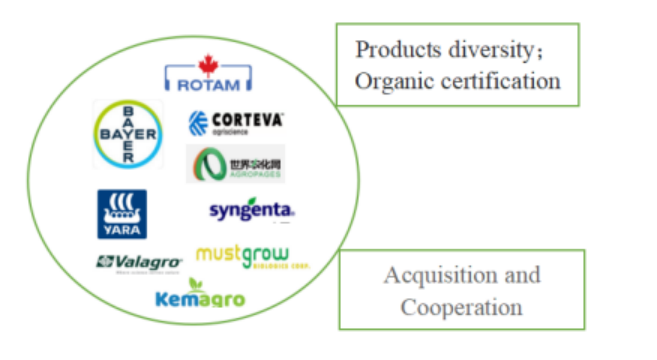Leading Agchem Companies Exploring Organic Farming
The production and supply of organic agricultural inputs are safeguards for the development of organic farming. In recent years, green pesticides and biological fertilizers have been a subject of research and development among the world’s agrochemical giants. Bayer, UPL and Corteva, in the past annual report, disclosed information on planned sustainable development. A major mainstream of these companies is to move forward towards transformative sustainable development, green agriculture and organic farming, which not only cover environmentally-friendly pesticides, biological fertilizers and biostimulants, but also includes the incentive measures to explore organic farming or low-carbon agricultural production.

Diversified product varieties and promotion of organic certification
The core competitiveness of bio-organic fertilizers, biopesticides and biostimulants, stands for the scientific and technological level of an enterprise. In recent years, agrochemical enterprises have gradually switched to diversification of product research and development, being very active in the promotion of organic certification.
Bayer’s biological crop protection portfolio encompasses more than 20 commercial and licensed products covering 60 million acres of field crops and high-value vegetables, which enable it to be an industry leader. Bayer’s recent launch of products, such as Flipper™ and Serenade™, provides an excellent pest control solution for its organic production system.
On December 29, 2021, Bayer launched its first innovative amino acid-based biostimulant, Anbishen, into the Chinese market. The product contains 19 kinds of amino acids that meet different needs of plants in different stage of growth, which improves the growing environment of plants. According to the International Federation of Organic Agriculture Movements (IFOAM), the product is applicable to organic farming.
The biostimulant Yoduo®, invested and developed by Rotam (Europe), was released to the market in 2021 with the function to improve flowering and fruit setting, while Starstreak® is scheduled for market launch in 2022 with the function to facilitate growth of plant roots, both of which are registered for organic farming.
In China, Corteva has formulated a development strategy tailored to local conditions and released the company’s first corporate sustainability report last year. Up to date, Corteva, including its former company, has launched more than 30 types of active ingredients and more than 100 crop protection products. So far, Corteva has actively responded to the requirement of green food certification on the agricultural means of production.
At present, 20 products from Corteva have been certified by the China Green Food Association as specific green crop production inputs, which will help growers to reduce pesticide residues, while effectively controlling pests and diseases. It is reported that Corteva’s first biostimulant, UtrishaTMN, has been released to the North American market, which is also expected to be introduced into the Chinese market via an examination and approval process.
Companies quickly stepping into organic farming through acquisition or collaboration
While competition in the agricultural materials market becomes intense, enterprises are faced with the challenge of resource optimization, where enterprises with the advantages of technology and supply chain may capture a larger market share and will expand their businesses. The acquisition and restructuring among enterprises, as well as the win-win collaboration, will inevitably become an industry trend.
The European YARA acquired the Finnish company Ecolan in 2021, which is regarded as an expansion of YARA’s organic fertilizer business. Ecolan started as a small-scale producer and has grown into Finland’s leading circular economy-oriented chemical company. After being merged by YARA, Ecolan’s technology and production have been extended to the international market. The circular economy plays an important role in improving the efficient use of the nutrients in organic fertilizers, which is one of YARA’s core competencies. YARA could improve its organic fertilizer production and optimization through strategic partnerships with waste management companies and food companies, coupled with Ecolan’s accumulated crop nutrition technology.
Earlier this year, Bayer and MustGrow signed an exclusive partnership agreement on joint sustainable development of organic biological products in Europe, Asia Pacific, the Middle East and Africa. MustGrow has granted Bayer part of its intellectual property rights, having authorized Bayer the exclusive right in Europe, Asia Pacific, the Middle East and Africa of applications of MustGrow’s biological herbicides and potato storage technique (including sprout inhibition). Bayer is obliged to finance laboratory operation, farmland development, and regulatory compliance to promote the process of commercialization. The cooperation is expected to be a great facilitation to the research and development of biopesticides for plants and a natural defense regulating agents for vegetable seeds.
Last year, Syngenta acquired the biological company Valagro , while Vanguard purchased the biological inputs supplier Agrinos. Biopesticides and biostimulants are attracting increased attention, as more top leading companies are joining the competition in the biological market.
Due to the impact of the global pandemic and the energy crisis, organic inputs with economic value are destined to become increasingly appealing. Manufacturers’ production and supply are a strong driver in the development of organic farming. So, what are the views of our readers toward the organic farming strategy of manufacturing? How do you view manufacturers’ product research and development? What is your opinion of manufacturers’ market deployment?
What are your activities in this field, AgroPages would like to include your practices and solutions in our publication.
Source: AgroPages.com


